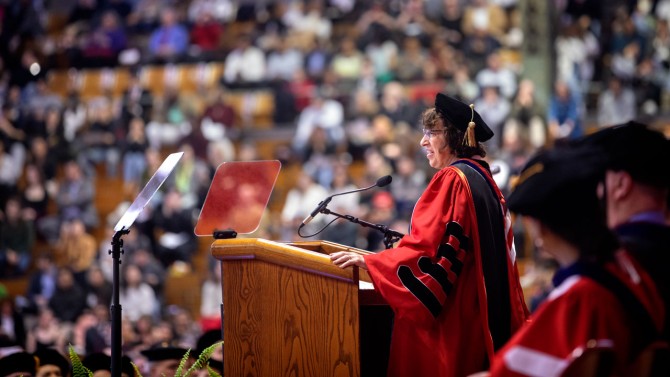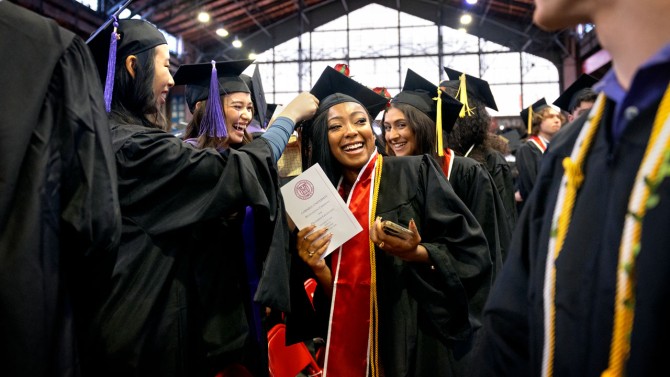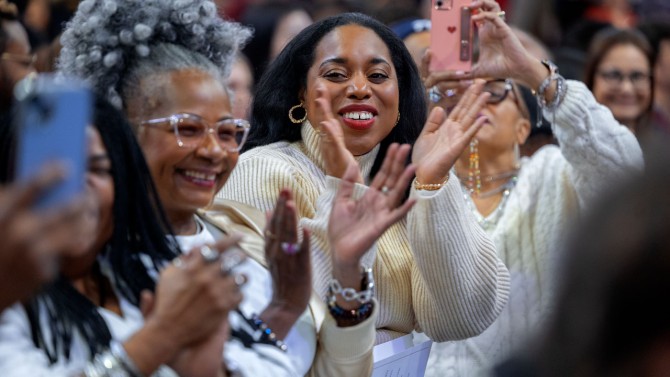Roberto Amador, B.Arch '24, who moved to the U.S. from Cuba eight years ago, didn't get into Cornell on his first try, but after two years studying at another university, he received his acceptance letter.
"Cornell is the best university for architecture in all the U.S., so I gave it my shot, and it has been a true blessing since the moment I get here," said Amador, who was among 600 graduates honored at the December Recognition Ceremony, held Dec. 17 in Barton Hall. "It feels like I have accomplished something worth my father's and mother's sacrifice, and an example for my son to look up to."
Amador's wife - who is expecting a baby boy - as well as his parents, mother-in-law and younger brother, also a Cornell student, were among the 2,500 friends and family members in the audience at the annual ceremony, which recognized students receiving bachelor's, master's and doctoral degrees. Some family members waved and carried flowers; a few raised paper cutouts of their graduate's faces on sticks in celebration. Deans asked the graduates from their colleges to rise before recommending them for degrees, which President Martha E. Pollack then conferred.
President Martha E. Pollack encouraged students to embrace a lifetime of learning in her remarks to graduates during the December Recognition Ceremony.
"At each stage of our education, we add more layers of complexity [to our understanding] - each step deepening our comprehension a layer beyond what we perceived before," Pollack said in her speech. "We learn, in short, that the world is endlessly complex; that grappling with complexity demands hard work, patience, determination and sometimes even courage; and we learn that the effort we invest in understanding our one, beautiful, yet deeply imperfect world is meaningful, and it's worthwhile."
Amador said his Cornell education inspired him to consider how people influence and are influenced by physical spaces - such as historic Barton Hall.
Being at Cornell, he said, "has really helped me to capture that emotion and bond that exist between buildings, environments and people and how they create stories - like this building, which previously was a [World War I-era] airplane hangar and now it's celebrating multiple cultures and students graduating."
More than 600 students received receiving bachelor's, master's or doctoral degrees at the Dec. 17 ceremony.
Fedra Vasquez '24, a student in the Cornell SC Johnson College of Business, also didn't expect to get an Ivy League education when she emigrated to the U.S. from Venezuela.
"I thought everything was going to be impossible," she said. "But now … I'm graduating from Cornell, one of the top universities in the country. It makes me feel super proud of myself and proud that I'm able to start building a future for my family here."
Her classes - as well as the diversity among her peers - taught her to think critically and inspired her curiosity. "Coming here and looking at different cultures and everything really opened my mind, and it really helped me to think differently," she said. "Cornell really helps you to build your knowledge and be aware of your surroundings and the diversity in the world."
More than 2,500 family and friends watched the Class of 2024's December graduates receive their degrees.
Shirin Dinasan '24, also an SC Johnson student, agreed that experiencing diversity at Cornell helped her become a lifelong learner. "We meet so many different unique individuals from all different parts of the world, who I would not have met otherwise," she said.
In closing her remarks, Pollack said that education doesn't stop at graduation. "As you leave Cornell and go out into the wider world," she said. "I hope that you … will view being educated not as a state you've achieved, but as an ongoing process to always engage in; and that you resist the temptations of easy answers and simple narratives, recognizing that a world of endless beauty and complexity will never fit into familiar patterns, with predictable results - and what a joy that is."









